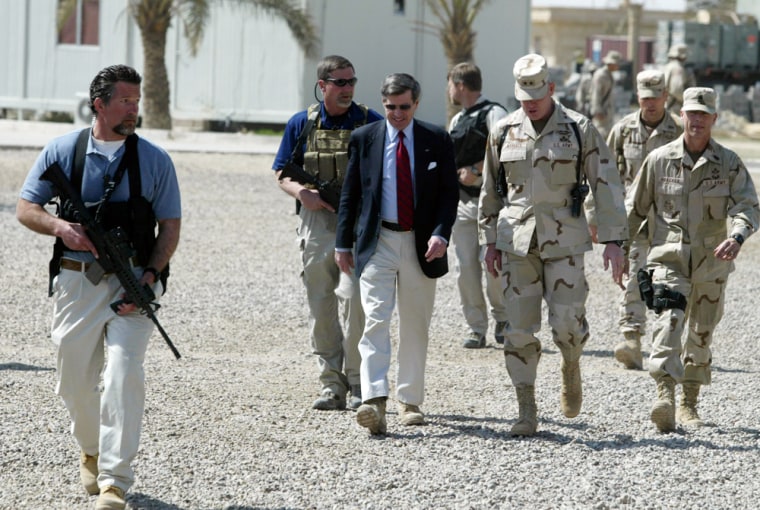Secretary of State Condoleezza Rice has ordered an overhaul of U.S. Embassy security practices in Iraq, tightening government oversight of diplomatic convoys escorted by private security contractors following the Blackwater USA shooting incident in which 13 Iraqis were killed in Baghdad.
Rice accepted preliminary recommendations from an internal review board that call for Diplomatic Security agents to accompany every convoy, the installation of video cameras in security vehicles, audio recordings of radio traffic between the embassy and such convoys and improved coordination and communication between convoys and the U.S. military.
The moves are aimed at “putting in place more robust assets to make sure that the management, reporting and accountability function works as best as it possibly can,” State Department spokesman Sean McCormack said.
He did not say that previous Blackwater and U.S. practices were lacking in proper safeguards for accountability, but instead noted that under the new orders State will have better control of the operations of private contractors, including Blackwater. The company is the largest of three private security firms that guard U.S. diplomats in Iraq.
Rice ordered the review of security procedures after a Sept. 16 incident in which Blackwater guards are accused of opening fire on Iraqi civilians while driving through a main square in Baghdad. Blackwater contends its employees came under fire first, but the Iraqi government and witnesses have disputed that, saying the guards opened fire for no reason.
Multiple inquiries
The United States has not made conclusive findings about the incident, although there are multiple investigations under way to determine exactly what happened. The FBI on Thursday took control of what had been a State Department probe, in part to prepare for the possibility that the case may be referred to the Justice Department for prosecutions.
The orders issued on Friday were recommended by a separate State Department commission that Rice created to look into the Baghdad embassy’s overall security practices, which rely almost entirely on private contractors who operate under nebulous jurisdiction and authority.
The panel is being led by Patrick Kennedy, one of the most senior management experts in the U.S. foreign service. Rice also brought in outside experts, including: retired Gen. George Joulwan, a former NATO commander in Europe, Stapleton Roy, a retired veteran diplomat, and Eric Boswell, a former State Department and intelligence official.
Kennedy has been in Baghdad for nearly a week and Rice had asked him to prepare a preliminary review by Friday.
McCormack noted that not all members of his team were in Baghdad yet and stressed that Rice’s decision to implement the changes did not preclude further revisions to the department’s security policies that might be recommended later.
Prior to the orders given by Rice on Friday, diplomatic security agents only accompanied U.S. convoys on an “ad hoc” basis, according to McCormack. Now, at least one agent will be in every convoy, he said.
'Full connectivity'
In addition, video cameras had not been previously mounted in convoy vehicles as a matter of policy and radio traffic had been monitored but not recorded by the embassy, he said. Rice’s new orders also mandate that convoys have direct contact with tactical U.S. military teams in their vicinity, he said.
“In case there is an incident, we will have an improved capability to ensure that we have all the possible information we can collect to determine exactly what happened,” McCormack said. “And, we want to make sure that we have full connectivity, up and down the chain, with the military operating in the area.”
The State Department has counted 56 shooting incidents involving Blackwater guards in Iraq this year. All were being reviewed as part of the comprehensive inquiry that Rice ordered.
